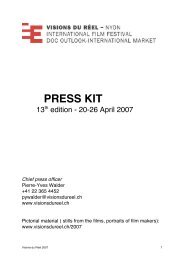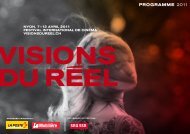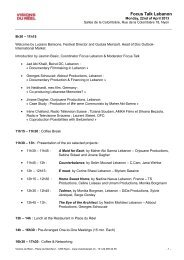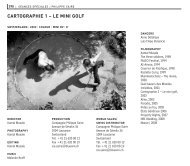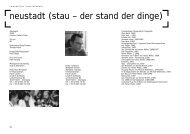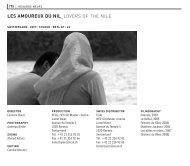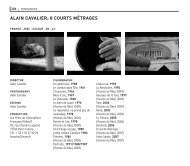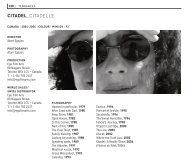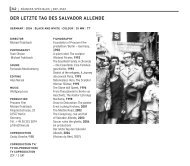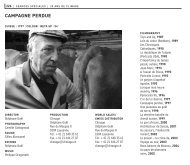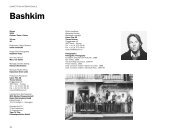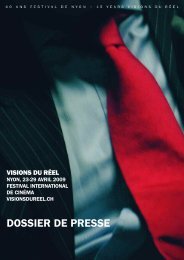Katalog 2013.pdf - Visions du Réel
Katalog 2013.pdf - Visions du Réel
Katalog 2013.pdf - Visions du Réel
You also want an ePaper? Increase the reach of your titles
YUMPU automatically turns print PDFs into web optimized ePapers that Google loves.
210 atelier – eyal sivan<br />
(as can be seen in Bernard Mangiante’s<br />
film ‘Le Khmer rouge’ et le non-violent).<br />
Sivan himself has made it clear:<br />
“Historical revision normally means to<br />
deny something.”<br />
Therefore, revision can only depart from<br />
a “shift of the point of view”. This way,<br />
we can begin to imagine a “counter<br />
history,” and it is exactly this aspiration<br />
to becoming a different (hi)story that<br />
fleshes out Sivan’s formal and cinematic<br />
discourse.<br />
If we consider the narration of history as<br />
a frame (a film frame if you like), then<br />
we must inevitably wonder what was<br />
left out of this frame that is commonly<br />
accepted as the ‘truth’ of ‘history’. The<br />
next inevitable step is to consider the<br />
frame as a form of censorship. By way<br />
of the frame, something is always left<br />
out of the picture. It is not a coincidence<br />
that Sivan, with notable polemical wit,<br />
has declared that “documentary is like a<br />
secular church.” Sustained by something<br />
he himself defines “a compassionate<br />
arrogance”, he poses a crucial question<br />
on the role played by memory in the process<br />
of canonization of historical truth.<br />
Along with Goethe, while questioning<br />
the meaning of ‘memory’, Sivan wonders<br />
what was forgotten (excluded) from<br />
memory itself. This is the reason why<br />
one of the major objectives of his work<br />
Along with Goethe, while<br />
questioning the meaning<br />
of “memory”, Sivan wonders<br />
what was forgotten (excluded)<br />
from memory itself.<br />
is to pursue “an encounter between<br />
two exclusions” (see in particular the<br />
reflection to be found in Etat commun –<br />
Conversation potentielle [1]), well aware<br />
that “memory can be a tool of crime”<br />
because if you are the victim then you<br />
will never be the culprit (or the perpetrator).<br />
It becomes clear, then, that a considerable<br />
portion of Sivan’s operative<br />
strategies is not to provide answers at<br />
all costs but to “reformulate questions”.<br />
This is the only way to make documentary<br />
“counter history”.<br />
In the evolution of Sivan’s work another<br />
encounter has played a pivotal role,<br />
partly <strong>du</strong>e to the circumstances in which<br />
it happened, and partly for its potential<br />
as continuing conversation (even<br />
though it actually is a circular, ‘complete’<br />
dialogue): his encounter with philosopher<br />
Yeshayahu Leibowitz.<br />
A staunch adversary of Israel’s nationalist<br />
politics, Leibowitz was born in 1903<br />
in Russia, which he left in 1916 to seek<br />
refuge in Berlin. A committed Zionist,<br />
he left Germany in 1934 and moved<br />
to Palestine along with his wife Greta.<br />
With his firm belief that state and religion<br />
should be two separate, independent<br />
bodies he was at odds with David<br />
Ben-Gurion. His later stance taken in<br />
favour of the withdrawal of Israeli troops<br />
from the occupied territories, his invitations<br />
to insubordination, and his troublesome<br />
conviction that Israel’s regression<br />
began exactly in concomitance with<br />
winning the Six-Day War make him a<br />
point of reference for dissidents as well<br />
as the perfect, negative example of the<br />
Jew who encourages anti-Semite arguments.<br />
That is what his enemies in the<br />
Parliament said and reiterated the day<br />
after Leibowitz was awarded the prestigious<br />
Israel Prize for Culture.<br />
It might be argued that by way of his<br />
encounter with Leibowitz, Sivan defined<br />
a listening approach that would shape<br />
all his later work.<br />
Old Leibowitz speaks slowly in the film<br />
Itgaber. His speech is interspersed with<br />
izkor<br />
long silences. He highlights certain<br />
words with great attention and reiterates<br />
those parts of his argument he deems<br />
crucial. A monitor placed on the philosopher’s<br />
desktop allows us to listen again<br />
to moments of the conversation and to<br />
check the film editing almost in real time<br />
(as can be seen when Leibowitz criticizes<br />
Sivan for cutting something out<br />
at a certain point). But there is more to<br />
it: gra<strong>du</strong>ally, Sivan creates a connection<br />
between the present of Leibowitz’s<br />
argument and the past by overlapping<br />
him speaking with archive footage. Even<br />
though the context changes, the meaning<br />
and the words do not.<br />
Being “memory selective by definition”,<br />
meeting Leibowitz – who is a Zionist,<br />
whereas Sivan isn’t – does not constitute<br />
a corpus of truths to pass on to<br />
the converted, but an ethical model as<br />
regards the use of truth, by keeping it<br />
open, problematic and non-exclusive of<br />
other voices and stories.<br />
During this process of understanding,<br />
sharing and opening, Sivan began<br />
to grow a new stance compared to<br />
the editing that is fully manifest in Un<br />
Spécialiste – Portrait d’un criminel<br />
moderne. As was acutely remarked<br />
by Gal Raz in his essay ‘Narrative<br />
Sabotage as a Tactic in the Arena of<br />
the Collective Memory: an Alternative<br />
Logic of Documentation in Eyal Sivan’s<br />
Un Spécialiste’: “The film does not



